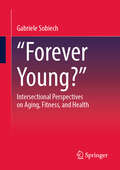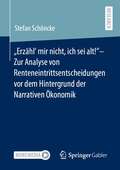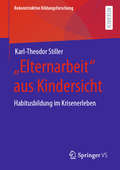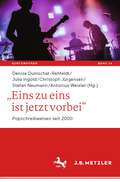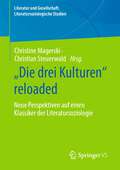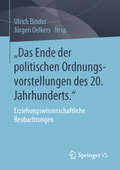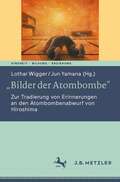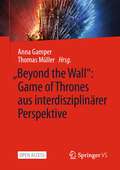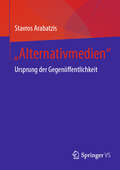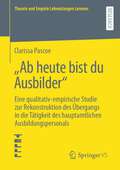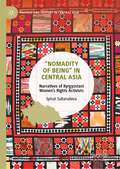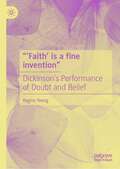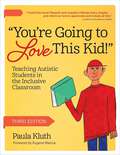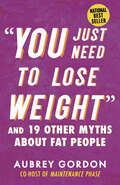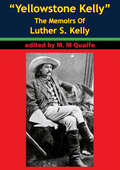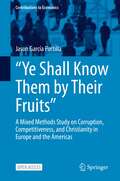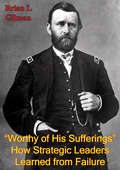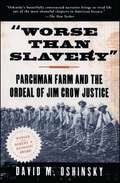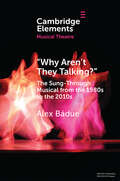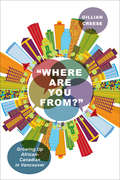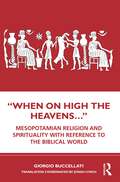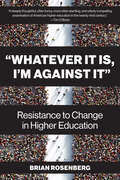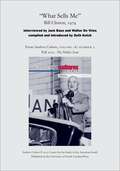- Table View
- List View
„Forever Young?“: Intersectional Perspectives on Aging, Fitness, and Health
by Gabriele SobiechThe demographic change presents new, primarily financial challenges for the state, politics, and the economy (level of power and domination relations). Aging (doing age) should be understood as a social construct that primarily offers self-empowerment opportunities for those who can follow the trend of age activation through sports/fitness due to higher educational qualifications and greater financial resources, and who maintain a healthy lifestyle. The goal of this project was to analyze fitness studio advertising from an intersectional and inequality-reflective perspective based on the structural categories of body/aging, gender, and class. It aimed to interview trainers with a focus on older active individuals (representation level) and to take a differentiated look at the self-techniques of older women active in fitness studios gathered through a qualitative interview study (subject level). On one hand, working on the body can strengthen one's own social positioning; on the other hand, devaluing others who do not follow the trend can give rise to a new form of 'lookism.'
„Erzähl‘ mir nicht, ich sei alt!“– Zur Analyse von Renteneintrittsentscheidungen vor dem Hintergrund der Narrativen Ökonomik
by Stefan SchönckeDas vorliegende Buch beschäftigt sich mit der Frage, wie Menschen ihre Renteneintrittsentscheidung treffen. Die Narrative Ökonomik kann das ökonomische Verständnis dafür erweitern, sie ergänzt die Erkenntnisse bisheriger Modellierungen und liefert Erklärungen für bislang nicht erklärbare Phänomene. Nach differenzierten Literaturstudien zu Renteneintrittsentscheidungen und zur Narrativen Ökonomik schlägt der Autor dafür zunächst eine Definition von Narrativen und eine Konzeption ihrer Funktionen vor. Er schließt damit eine theoretische Lücke in der noch jungen Literatur der Narrativen Ökonomik. Darauf aufbauend wird eine „Theorie narrativer Renteneintrittsentscheidungen“ entwickelt und am Beispiel der Bundesrepublik Deutschland empirisch getestet. Durch eine neue Kombination von qualitativen und quantitativen Methoden werden für das Thema relevante Narrative identifiziert und darauf fußende Hypothesen mit quantitativen Zeitreihenmodellen getestet.
„Elternarbeit“ aus Kindersicht: Habitusbildung im Krisenerleben (Rekonstruktive Bildungsforschung #30)
by Karl-Theodor StillerSchulische „Elternarbeit“ wird von Grundschüler*innen im Kontext ihrer schulischen Habitusbildung als Krise erlebt, die sie in der Differenzerfahrung von Regelkenntnis und Regelpraxis mit Hilfe einer verstärkten Peerorientierung bewältigen. Das rekonstruktive Forschungsprojekt von Karl-Theodor Stiller basiert auf Gruppendiskussionen mit Schüler*innen aus dritten Klassen und entfaltet eine spezifische Gegenstandskonzeption, basierend auf der dokumentarischen Methode, mit deren Hilfe wichtige Elemente der Krisenbewältigung im Kontext schulischer „Elternarbeit“ sichtbar werden.
„Eins zu eins ist jetzt vorbei“: Popschreibweisen seit 2000 (Kontemporär. Schriften zur deutschsprachigen Gegenwartsliteratur #14)
by Christoph Jürgensen Antonius Weixler Julia Ingold Stefan Neumann Denise Dumschat-RehfeldtDer Band nimmt das titelgebende Tocotronic-Zitat zum heuristischen Ausgangspunkt, um das Verhältnis von Kunst und Wirklichkeit und damit den Entwurf von ‚Realität‘ insgesamt in deutschsprachigen Popschreibweisen seit 2000 zu untersuchen. Während das literarische Feld sich in der Folge von 9/11 etwa tendenziell zu einem „Relevanten Realismus“ bekannte, wandte sich die Hamburger Schule in den frühen 2000er Jahren eher einer ästhetizistischen Hochkunstphase zu. Seit den 2010er Jahren lässt sich wiederum eine neue Welle ‚relevant realistischer‘, politisch-engagierter Popsongs erkennen.
„Die drei Kulturen“ reloaded: Neue Perspektiven auf einen Klassiker der Literatursoziologie (Literatur und Gesellschaft. Literatursoziologische Studien)
by Christine Magerski Christian SteuerwaldDas Buch legt eine aktuelle Bestandsaufnahme der Aufgaben und der Reichweite der Literatursoziologie vor.
„Der geliebten Sophie nachsterben“: Der Selbstmord in der medizinischen und philosophischen Literatur der Romantik (Medizin, Kultur, Gesellschaft)
by Brigitte Dahmen-RoscherForschung und Behandlungsmethoden der psychiatrisch tätigen Ärzte in der Zeit der Romantik wurden von der Philosophie des deutschen Idealismus, der romantischen Bewegung mit ihrer naturphilosophisch orientierten Weltsicht und den Erkenntnissen der aufgeklärten französischen Psychiater geprägt. Die „Psychiker“ vertraten die Ansicht, bei der Selbstmordneigung sei die Seele erkrankt, für die „Somatiker“ stellte sie sich als Folge einer körperlichen Erkrankung dar. Es wird ein Bogen geschlagen zu den Selbstmordtheorien im 20. und 21. Jahrhundert; dabei wird deutlich, dass einige Ideen und Vorstellungen überraschend aktuell geblieben sind.
„Das Ende der politischen Ordnungsvorstellungen des 20. Jahrhunderts.“: Erziehungswissenschaftliche Beobachtungen
by Jürgen Oelkers Ulrich BinderDer Band fasst erziehungswissenschaftliche Erkenntnisse und Positionierungen zur aktuellen historischen Phase, die mit guten Gründen als der endgültige Bruch mit soziopolitischen, -kulturellen und -moralischen Ordnungsvorstellungen des 20. Jahrhunderts bezeichnet wird, zusammen.
„Das Ende der politischen Ordnungsvorstellungen des 20. Jahrhunderts.": Erziehungswissenschaftliche Beobachtungen
by Jürgen Oelkers Ulrich BinderDer Band fasst erziehungswissenschaftliche Erkenntnisse und Positionierungen zur aktuellen historischen Phase, die mit guten Gründen als der endgültige Bruch mit soziopolitischen, -kulturellen und -moralischen Ordnungsvorstellungen des 20. Jahrhunderts bezeichnet wird, zusammen.
„Bilder der Atombombe“: Zur Tradierung von Erinnerungen an den Atombombenabwurf von Hiroshima (Kindheit – Bildung – Erziehung. Philosophische Perspektiven)
by Lothar Wigger Jun YamanaDas Buch beschreibt und analysiert ein Bildungsprojekt des Friedensgedächtnismuseums Hiroshima und der städtischen Motomachi Senior High-School, das einen neuartigen Weg einschlägt und bis heute einmalig ist. In dem Projekt „Pictures of the Atomic Bomb: Drawing with the Next Generation“ setzen Schüler:innen die Erzählungen von Opfern des Atombombenabwurfs in Gemälde um. Der Band präsentiert zum ersten Mal das Projekt außerhalb Japans und interpretiert und diskutiert es in einem internationalen wissenschaftlichen Kontext. Das Buch enthält neben zahlreichen Abbildungen Erfahrungsberichte von Schüler:innen, die an dem Schulprojekt teilgenommen haben, sowie wissenschaftliche Interpretationen und Analysen japanischer und deutschsprachiger Wissenschaftler:innen aus pädagogischer, psychologischer, kunsttheoretischer, medienwissenschaftlicher, sozialwissenschaftlicher und philosophischer Perspektive. Zur Zielgruppe gehören neben diesen Wissenschaften auch Schulen, Museen und die interessierte Öffentlichkeit.
„Beyond the Wall”: Game of Thrones aus interdisziplinärer Perspektive
by Thomas Müller Anna GamperDieses Open-Access-Buch beleuchtet das Serienphänomen „Game of Thrones“ aus unterschiedlichen wissenschaftlichen Perspektiven: Die rechtswissenschaftliche trifft auf die sprach-, musik-, literatur- und sozialwissenschaftliche, ferner die (kunst-)historische, psychologische und theologische Perspektive. Die Beiträge zeigen auf, dass die Serie reiche Anknüpfungspunkte für die wissenschaftliche Forschung unterschiedlichster Fachrichtungen bietet, die auch dazu anregen, sprichwörtlich „beyond the wall“ zu denken. Das Buch spricht dabei sowohl ein interdisziplinäres wissenschaftliches Publikum als auch sonstige Fans der Serie an.
„Alternativmedien“: Ursprung der Gegenöffentlichkeit
by Stavros ArabatzisDieses Buch geht der Frage nach, inwiefern die neuen Medien der Gegenöffentlichkeit eine wirkliche ‚Alternative‛ darstellen. Dabei versucht es die moderne Funktion der Gegenöffentlichkeit auch von ihrem Ursprung her zu denken, wie sie etwa in der Figur eines Sokrates oder im Höhlengleichnis Platons als „Gewaltsamkeit‟ von Unter- und Oberwelt vorformuliert wurde. Der Rekurs auf den ‚Ursprung‛ der Mainstream- und Alternativmedien ist kein historizistisches, akademisches, altphilologisches Unternehmen, das von Griechenland aus hereingaloppierend in unserer Zeit endet. Vielmehr beschreibt er die Fassade der Mainstreammedien, hinter der eine Entwicklung im Gegensinn, zum archaischen Grund hin verläuft und auf den heute die Alternativmedien in ihrer Kritik eine Antwort suchen. Die Kehrseite dieses Prozesses der Öffentlichkeit ist nämlich die heimliche Durchsetzung der alten, archaischen Imperative (heute befehlen sie: ‚Sei demokratisch!‛ oder ‚Sei autokratisch!‛) innerhalb von Aufklärung, Modernität, Emanzipation und Befreiung. Das Buch versucht sowohl den Mainstreammedien als auch den Alternativmedien in ihrer Kritik gerecht zu werden.
„Ab heute bist du Ausbilder“: Eine qualitativ-empirische Studie zur Rekonstruktion des Übergangs in die Tätigkeit des hauptamtlichen Ausbildungspersonals (Theorie und Empirie Lebenslangen Lernens)
by Clarissa PascoeIn diesem Buch wird der Übergang aus einer Tätigkeit als gewerblich-technische Fachkraft in die hauptamtliche Ausbildungsfunktion in einer betrieblichen Ausbildungswerkstatt untersucht. In einem fallrekonstruktiven Forschungsansatz wird das Erleben und Bewältigen von typischen Herausforderungen während und infolge dieses Übergangs nachgezeichnet. Hierzu wurden hauptamtliche Ausbilder*innen in den industriellen Metall- und Elektroberufen zu ihren Übergangserfahrungen befragt. Ergebnis ist eine empirisch fundierte Beschreibung von fünf typischen Entwicklungsaufgaben, mit denen Ausbilder*innen während und infolge des Übergangs konfrontiert werden und die sie in Abhängigkeit von subjektiven Ressourcen und Orientierungen unterschiedlich deuten und bearbeiten. Die Fallrekonstruktion führt zu vier Typen von Bewältigungsstrategien, die sich hinsichtlich ihres Umgangs mit Erfahrungswissen, ihrer pädagogischen Überzeugungen sowie ihres Reflexionswissens unterscheiden. Darauf aufbauend wird mit Hilfe des Sozialweltkonzeptes die Frage nach der Rolle und Funktion einer übergeordneten kollegialen Bezugsgemeinschaft als potentielle Wissens- und Kompetenzgrundlage der Akteure der beruflich-betrieblichen Bildung vor dem Hintergrund der strukturellen Rahmenbedingungen und Systemspezifika diskutiert.
”Nomadity of Being” in Central Asia: Narratives of Kyrgyzstani Women’s Rights Activists (Politics and History in Central Asia)
by Syinat SultanalievaThis book offers a new framework for understanding feminism and political activiism in Kyrgyzstan, “nomadity of being. ” Here, foreign information and requirements, even forced ones, are transformed into an amalgamation of the new and the old, alien and native—like kurak, a quilted patchwork blanket, made from scraps. Conceptualizing feminist narratives in Kyrgyzstan, while keeping in mind, the complex relationship between ideological borrowing, actualization, appropriation or self-colonization of “feminist” concepts can expand both scholarly and activist understanding of specificities of post-Soviet feminisms from a historiographic point of view. Kurak-feminism is feminism that is half-donor-commissioned, half-learned through interactions (personal, media, academic, professional), unashamed of its borrowed nature and working toward its own purpose that is being developed as the blanket is being quilted. Weaving in elements from completely different and, to a Western eye, incompatible approaches nomadity of being might pave the way toward a Central Asian reframing of non-Western feminisms. This provocative text will interest scholars of European politics, the post-Soviet sphere, and feminists.
“‘Faith’ is a fine invention”: Dickinson’s Performance of Doubt and Belief
by Regina YoongThis book covers nineteenth-century American poet Emily Dickinson who captured the multifaceted nature of life in all of its uncertainties. Studies on her exploration of faith are ample, but in this book, the author uncovers Dickinson’s playful role-play in enacting solemn themes of religion, death, and the unknown. Dickinson’s creativity encompasses not only her use of language but also her poetic personae and self-created poetic stages inviting readers to question, contemplate deeply or even poke fun at life's absurdities. By using performative roles such as the rejected outcast, passive supplicant, and playful warrior, Dickinson unveils--through a paradoxical framework of belief and unbelief-- a line of inquiry that is multifocal and erratic to “tell all the truth and tell it slant.”
“You're Going to Love This Kid!”: Teaching Autistic Students in the Inclusive Classroom, Third Edition
by Paula Kluth“You Just Need to Lose Weight”: And 19 Other Myths About Fat People (Myths Made in America)
by Aubrey GordonThe co-host of the Maintenance Phase podcast and creator of Your Fat Friend equips you with the facts to debunk common anti-fat myths and with tools to take action for fat justice. <p><p>The pushback that shows up in conversations about fat justice takes exceedingly predicable form. Losing weight is easy—calories in, calories out. Fat people are unhealthy. We’re in the midst of an obesity epidemic. Fat acceptance “glorifies obesity.” The BMI is an objective measure of size and health. Yet, these myths are as readily debunked as they are pervasive. <p><P>In “You Just Need to Lose Weight,” Aubrey Gordon equips readers with the facts and figures to reframe myths about fatness in order to dismantle the anti-fat bias ingrained in how we think about and treat fat people. Bringing her dozen years of community organizing and training to bear, Gordon shares the rhetorical approaches she and other organizers employ to not only counter these pernicious myths, but to dismantle the anti-fat bias that so often underpin them. <p><p>As conversations about fat acceptance and fat justice continue to grow, “You Just Need to Lose Weight” will be essential to ensure that those conversations are informed, effective, and grounded in both research and history. <p> <b>New York Times Bestseller</b>
“Yellowstone Kelly” - The Memoirs Of Luther S. Kelly
by Luther S. Kelly Milo S. Quaife‘In the narrative of “Yellowstone Kelly” we have a rare story of adventure and service. General Miles, who knew him long and intimately, fitly compares him with such heroes of the American wilderness as Daniel Boone and David Crocket...His story is at once an important contribution to the history of the western frontier in the decades to which it pertains and a thrilling tale of sustained adventure’ - M. M. Quaife.‘What old ‘Yellowstone’ has to say is extremely interesting, and he tells it in simple, straightforward fashion, with a wealth of absorbing detail’ - “New York Times”. ‘Mr. Kelly writes not as a novelist, but as a historian, and his work is rich in the best qualities of both’ - “Outlook”.‘His memoirs [are] written with a rare skill in narration...It is a part of the story of the West and particularly of the Yellowstone region that we could ill afford to lose’ - “Review of Reviews”.‘Here is history in a most entertaining form’ - “Boston Transcript”.
“Ye Shall Know Them by Their Fruits”: A Mixed Methods Study on Corruption, Competitiveness, and Christianity in Europe and the Americas (Contributions to Economics)
by Jason García PortillaWhy are historically Catholic countries and regions generally more corrupt and less competitive than historically Protestant ones? How has institutionalization of religion influenced the prosperity of countries in Europe and the Americas?This open access book addresses these critical questions by elucidating the hegemonic and emancipatory religious factors leading to these dissimilarities between countries. The book features up-to-date mixed methods from interdisciplinary research contributing to existing studies in the sociology of religion field by demonstrating—for the first time—the effect of the mutually reinforcing configuration of multiple prosperity triggers (religion–politics–environment). It demonstrates the differences in the institutionalization of Roman Catholicism and Protestantism by applying quantitative and qualitative methods and by performing a qualitative comparative analysis (QCA) of 65 countries. The author also provides a comprehensive survey and results of empirical research on different theories of development, focusing on the influence of religion.
“Worthy Of His Sufferings”: How Strategic Leaders Learned From Failure
by Brian J. GilmanHistory provides numerous examples of leaders who failed at some point in their career, yet went on to become great leaders. Their example demonstrates that experiencing failure does not necessarily equate to failed leadership-leaders can and do recover from failure to become better leaders. But how does this occur? How does a leader turn the psychological trauma of failure into an important learning experience that leads to personal growth? What leadership characteristics and actions are most important in recovering from a leadership failure? This paper examines these questions along several major themes: first, the psychological trauma of failure and the pathways to post-traumatic growth following failure; second, a study of how contemporary leaders grew from failure; and third, historical case studies on two strategic leaders who grew from the experience of failure: Ulysses S. Grant and Dwight D Eisenhower. In conclusion, the paper compares the lessons from these historical case studies to those drawn from the first two themes to identify the key leadership characteristics and actions that enable leaders to recover from failure.
“Worse Than Slavery”: Parchman Farm and the Ordeal of Jim Crow Justice
by David M. Oshinsky"Worse Than Slavery" is an epic history of race and punishment in the deepest South from emancipation to the civil rights era - and beyond. Southern prisons have been immortalized in convict work songs, in the blues, and in movies such as Cool Hand Luke and The Defiant Ones. Mississippi's Parchman Penitentiary was the grandfather of them all, an immense, isolated plantation with shotguns, whips, and bloodhounds, where inmates worked the cotton fields in striped clothing from dawn to dusk. William Faulkner described Parchman as "destination doom." Its convicts included bluesmen like "Son" House and "Bukka" White, who featured the prison in the legendary "Midnight Special" and "Parchman Farm Blues.". Noted historian David M. Oshinsky draws on prison records, pardon files, folklore, oral history, and the blues to offer an unforgettable portrait of Parchman and Jim Crow justice - from the horrors of convict leasing in the late nineteenth century to the struggle for black equality in the 1960s, when Parchman was used to break the spirit of civil rights workers who journeyed south on the Freedom Rides. In Mississippi, the criminal justice system often proved that there could be something worse than slavery. The "old" Parchman is gone, a casualty of federal court orders in the 1970s. What it tells us about our past is well worth remembering in a nation deeply divided by race.
“Why Aren't They Talking?”: The Sung-Through Musical from the 1980s to the 2010s (Elements in Musical Theatre)
by Alex BádueIn the American musical theater, the most typical form of structuring musicals has been the book musical, in which songs interrupt spoken dialogue and add means to depict characters and dramatic situations. After 1980, a form of structuring musicals that expands upon the aesthetic conventions of the book musical came to prominence. Sung-through musicals challenged the balance between talking and singing in musical theater in scripts that are entirely or nearly entirely sung. Although often associated with British musicals, this Element focuses on American sung-through musicals composed and premiered between 1980 and 2019. Their creative teams have employed specific procedures and compositional techniques through which music establishes characterization and expression when either very little or nothing is spoken and thus define how the musical reinvented itself toward and in the twenty-first century.
“Where Are You From?”: Growing Up African-Canadian in Vancouver
by Gillian CreeseMetro Vancouver is a diverse city where half the residents identify as people of colour, but only one percent of the population is racialized as Black. In this context, African-Canadians are both hyper-visible as Black, and invisible as distinct communities. Informed by feminist and critical race theories, and based on interviews with women and men who grew up in Vancouver, "Where Are You From?" recounts the unique experience of growing up in a place where the second generation seldom sees other people who look like them, and yet are inundated with popular representations of Blackness from the United States. This study explores how the second generation in Vancouver redefine their African identities to distinguish themselves from African-Americans, while continuing to experience considerable everyday racism that challenges belonging as Canadians. As a result, some members of the second generation reject, and others strongly assert, a Canadian identity.
“When on High the Heavens…”: Mesopotamian Religion and Spirituality with Reference to the Biblical World
by Giorgio BuccellatiThis English translation of Giorgio Buccellati’s ambitious work offers readers an insightful discussion of ancient Mesopotamian religion and spirituality in its relationship to the biblical ethos. Our understanding of ancient Mesopotamian religion, while shaped by a wealth of archaeological, artistic, and epigraphic evidence, remains limited with regard to a proper hermeneutic approach. In this volume, Buccellati sheds light on the spirituality of Mesopotamian polytheism by drawing comparisons with that of biblical monotheism. These comparisons are used to better understand the divine-human relationship in the Mesopotamian context, as both individuals and members of a wider community. In addition, Buccellati provides detailed discussions on divination and the central role of fate in ancient Mesopotamia. Buccellati’s understanding of Mesopotamian religion and spirituality as illuminated by biblical texts, now available to an Anglophone audience, offers much food for thought on this challenging subject. "When on High the Heavens…": Mesopotamian Religion and Spirituality with Reference to the Biblical World provides a wide-ranging and thorough exploration of Mesopotamian religion for students, scholars, and researchers in Near Eastern archaeology and history, biblical studies, and the history of religion and spirituality.
“Whatever It Is, I’m Against It”: Resistance to Change in Higher Education
by Brian RosenbergAn invigorating work that identifies obstructions to transformative change in higher education and offers paths to break through. In &“Whatever It Is, I&’m Against It,&” president emeritus of Macalester College Brian Rosenberg draws on decades of higher education experience to expose the entrenched structures, practices, and cultures that inhibit meaningful postsecondary reform, even as institutions face serious challenges to their financial and educational models. A lively insider&’s account, the book pinpoints factors that hinder the ability of U.S. colleges and universities to be creative and entrepreneurial amid calls to improve affordability, access, and equity for students. Through pithy personal stories of divisive town hall meetings, multiyear college governance battles, and attempts at curricular reform, Rosenberg illustrates internal and external dynamics that impede institutional evolution. Pressures such as declining enrollment, escalating costs, and an oversupply of PhDs in academia have long signaled a grave need for reform within a profession that, as Rosenberg ruefully acknowledges, lacks organizational flexibility, depends greatly on reputation and ranking, and retains traditions, from the academic calendar to grading systems, that have remained essentially the same for decades. Rosenberg looks outside the U.S. system to find possible antidotes in innovative higher education models such as student-centered and experiential learning approaches. This thought-provoking work offers ample evidence for presidents, chancellors, deans, provosts, and faculty to consider as they plan their missions to achieve institutional transformation.
“What Sells Me”: Bill Clinton, 1974
by Walter De Vries Jack Bass Seth KotchYou can't be defensive about it. You don't apologize for it."This article appears in the Fall 2012 issue of Southern Cultures. The full issue is also available as an ebook.Southern Cultures is published quarterly (spring, summer, fall, winter) by the University of North Carolina Press. The journal is sponsored by the University of North Carolina at Chapel Hill's Center for the Study of the American South.
